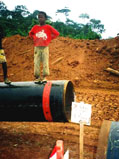
This op-ed by Nancy Birdsall originally appeared in the Los Angeles Times on January 2, 2006
Beating the 'curse' of natural riches
WHEN THE World Bank agreed to finance an oil pipeline for Chad four years ago, it went in with eyes wide open. Mindful of the possibility that the oil profits might be squandered — or stashed in overseas bank accounts by corrupt officials — the bank required Chad to agree to put aside the profits in special funds for education, health and other poverty-reduction programs. Ten percent was to be stashed in a rainy-day fund to help the country once the oil ran out.
Chad agreed, and the pipeline was built. But last week, the government of Chad announced that it was reneging on its promise — and there's almost nothing the World Bank can do about it. That puts Chad on its way to becoming another victim of what has come to be known as the "oil curse."
The curse of being blessed with natural resources is a problem not just in Chad but in Bolivia, Venezuela and Nigeria. The evidence is overwhelming that oil and mineral wealth hurts growth in developing countries. It generates more corruption than good jobs, and it undermines the development of property rights, responsive local government and the other political institutions that a successful economy requires.
While resource-poor South Korea and Taiwan have surged ahead in the last three decades, rapidly eliminating poverty, Angola, Nigeria, Bolivia and Venezuela — all resource rich — have failed their poor. Among developing countries blessed with natural resources, only Chile and Malaysia seem to have escaped the curse.
Some months ago, an independent study board concluded that the World Bank should halt the financing of oil and mining projects in developing countries because they too often end up hurting the poor, harming the environment and failing to contribute to economic growth. The bank ultimately rejected that recommendation, arguing that it couldn't simply stop helping poor countries finance these projects. If it did, multinational companies would be happy to step in and the investments would be made anyway.
But without the bank and the scrutiny and supervision it brings, the risks to the poor and the environment on which they rely for their livelihoods would be greater, not smaller.
So the issue is not whether the bank and other international lenders should step in, but how they can finance responsible development.
The problem is that whatever leverage the World Bank has is only temporary. Its clout runs out with its last check. Even special oil funds, such as the one established in Chad, turn out to be a poor and only temporary substitute for the public accountability and the checks and balances provided by a healthy democracy. In Chad, the corruption should have been obvious early: Despite oversight by nongovernmental organizations, the president of the country managed to use the first wave of revenue to buy a presidential airplane.
THERE IS an alternative. The bank should link its upfront support for investments in oil and mining industries to long-term supervision, say for 10 years, of distribution of most of the revenue directly to a country's citizens.
That's an idea that has worked in various forms in Alaska and in Canada's Alberta province — and that could also work in Iraq. Giving cash directly to the poor would boost their consumption and encourage the kind of investments in small farms and businesses that bring healthy, job-intensive growth. It limits official corruption, patronage and power grabs, and it creates the time and political space for strengthening the critical institutions of responsible government. Of course, the World Bank cannot end the curse alone — not if developing countries can easily get loans elsewhere. The rich nations that run the bank need to help in three ways:
- Each should enact legislation requiring total transparency of their oil and mining multinationals in financial dealings with the governments of developing countries.
- The rich members of the Organization of Economic Cooperation and Development should agree on legislation allowing each nation to prosecute corporations that are involved in corruption in developing countries.
- Private banks in OECD countries should be pushed to disclose their deposits from countries and rulers that have obviously been derived from natural resources. This would parallel efforts to track terrorism-related funds in the wake of 9/11.
The long-run answer to the natural-resource curse is the creation of sound institutions in developing countries. In the meantime, these three steps can reduce the risk of official corruption taking hold.
That's surely what the poor and powerless in the developing world would prefer.

